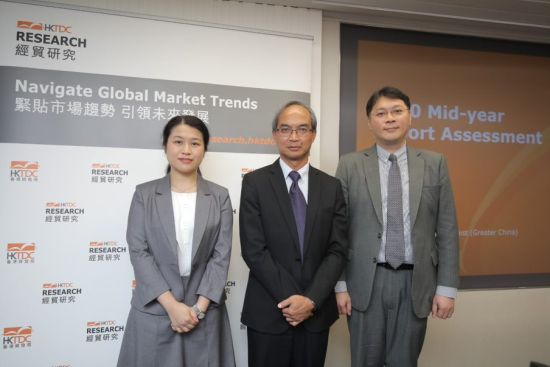Decade-low projection attributed mainly to COVID-19
Uncertainties about the length and depth of the economic downturn brought by COVID-19 and the ongoing threat of trade protectionism have led the Hong Kong Trade Development Council (HKTDC) to revise its forecast for Hong Kong’s export performance for 2020 to a decline of 10%, down from the previous prediction of a 2% fall.

“The revision takes into account the latest HKTDC Export Index survey, which indicated that 82% of the 500 exporters surveyed forecast their total sales will drop 10% or more year-on-year,” HKTDC Director of Research Nicholas Kwan said at a press conference today. “The spread of the COVID-19 pandemic (64.6%), weak global demand (19.5%) and the trade tensions between Mainland China and the United States (10.8%) are seen as the biggest threats.”
Meanwhile, 97.5% of the respondents – up 3.6 percentage points from last quarter – have experienced adverse shocks to their businesses because of COVID-19. These include buyers purchasing less (57%) or cancelling orders (52.3%), delays in product delivery (55.8%) and logistical disruptions (53.1%). In response to the pandemic, 67.6% of respondents had implemented remote-working arrangements, while more than 41% developed online sales channels to supplement conventional sales operations.
New normal
HKTDC Assistant Principal Economist (Global Research) Louis Chan said the unprecedented and overwhelming nature of the COVID-19 outbreak can be a timely game changer to taper the disconnect between words and actions in challenging the status quo, and encourage a new phase of creativity and sustainability, while preparing the global economy for a more resilient and robust post-COVID-19 future.
“Some businesses – including e-commerce marketplaces, pharmaceutical and healthcare companies, logistics solution providers, video-conferencing solution providers and entertainment streaming and online gaming platforms – are likely to thrive in this ‘new normal’,” Mr Chan said.
He predicted the pandemic will accelerate automation, and artificial intelligence (AI)-driven technology will become more mainstream as the global economy and industry reboots and tilts more towards digitalisation and automation. At the same time, business-model innovations that use big-data analytics, contactless solutions and new digital channels would help traditional commercial operations – such as restaurants, last-mile delivery, health, insurance, human resources, marketing and product development – undergo digital transformation and survive the COVID-19 crisis.
Export Index stabilises
The HKTDC Export Index rose a marginal 2.2 points to 18.2 in the second quarter of 2020. “This may indicate that the negative sentiment is now plateauing, yet the reading is still well below the 50-point watershed, indicating that Hong Kong’s exports performance is not likely to improve dramatically in the short term,” HKTDC Assistant Principal Economist (Greater China) Alice Tsang said.
“In addition, the Procurement Index fell by 4.3 points to a record-low of 10.5, with all major sectors dropping further – jewellery (2.0), clothing (9.4), electronics (10.4), toys (11.3), machinery (14.8) and timepieces (17.3) – showing buyers will source less in the coming months,” she said.
“Having said that, demand for electronics items related to computers, webcams, microphones and medical applications, wearable tech and smartwatches with health-monitoring functions, as well as comfortable, multi-purpose and athleisure wear are on the rise, while stylish fashion jewellery and design pieces and wedding items may also perform better,” Ms Tsang analysed.
Trade tensions back in focus
Ms Tsang said exporters remained cautious on near-term prospects in Hong Kong’s major markets. Japan (46.5) continued to be seen as the most promising, followed by the US (39.3) and Mainland China (39), while the European Union (35.0) was again rated as the least-appealing market.
“The US is the only market that recorded a drop in the index this quarter, this may be attributed to the fact that Hong Kong exporters had again become cautious on Sino-US trade tensions,” she said. “A total of 69.8% of respondents, up 20 percentage points from last quarter, were concerned the dispute would damage their exports prospects.”
“Smooth implementation of the deal under the current disruptive environment remains highly challenging,” Ms Tsang added.
Reference
– HKTDC Research website: http://research.hktdc.com/
– Podcast: https://bit.ly/37G92uJ
– 2020 Mid-Year Export Review: Double-digit decline due to pandemic and protectionism https://bit.ly/2XZlbaF
– Hong Kong Export Index 2Q20: Exporters Pessimistic as COVID-19 Outbreak Persists https://bit.ly/3cWfD56
– Navigating COVID-19: The Economic Shakeup https://bit.ly/2Uwhw2b
– Photo Download: https://bit.ly/2UOhKS8
About HKTDC
The Hong Kong Trade Development Council (HKTDC) is a statutory body established in 1966 to promote, assist and develop Hong Kong’s trade. With 50 offices globally, including 13 in Mainland China, the HKTDC promotes Hong Kong as a two-way global investment and business hub. The HKTDC organises international exhibitions, conferences and business missions to create business opportunities for companies, particularly small and medium-sized enterprises (SMEs), in the mainland and international markets. The HKTDC also provides up-to-date market insights and product information via trade publications, research reports and digital news channels. For more information, please visit: www.hktdc.com/aboutus. Follow us on Twitter @hktdc and LinkedIn.
Contact:
Beatrice Lam, Tel: +852 2584 4049, Email: beatrice.hy.lam@hktdc.org















